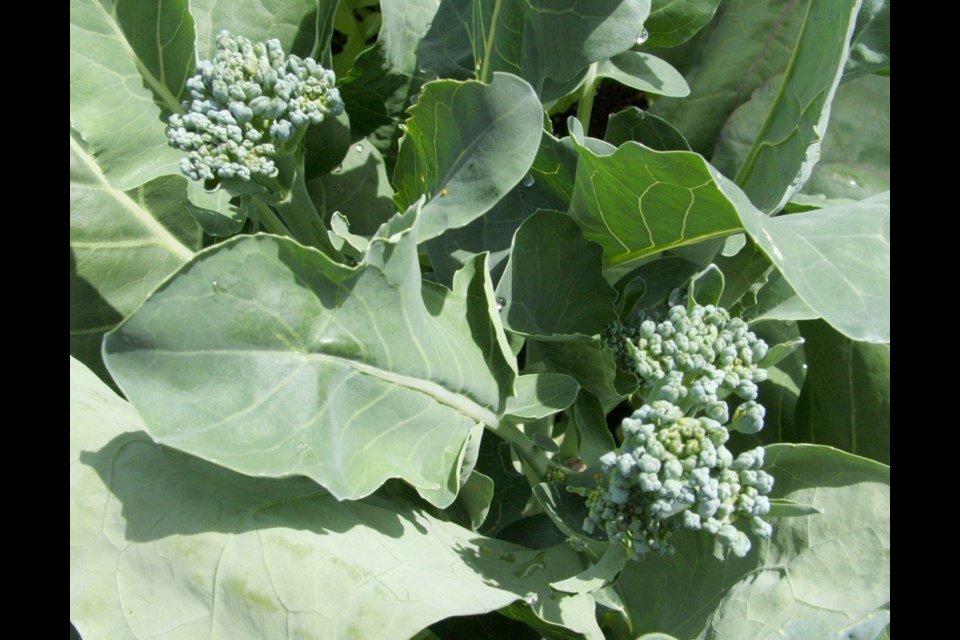With the mid-January freeze-up and relentless rains that followed, it wasn’t until Jan. 24 that I managed my first significant gardening session.
I surveyed the root and leafy vegetables for possible damage from the cold. All was fine. I’d gone rather overboard with the pre-frost protective coverings. I pruned some climbing roses by the garden shed and was surprised to find leaf buds already starting to open on some of the canes.
Temperatures had become unseasonably warm. I recorded daytime high temperatures of 9 C that weekend. Time, perhaps, to get beds ready for early plantings.
That’s my plan, though I’m remembering last year’s unusually warm winter temperatures until an early February deep freeze and snowfall that remained, in some parts of the Island, well into March.
Broccoli forever. Another little patch of garden I attended to on that January weekend held a row of five Aspabroc plants that had withstood the winter handily. Aspabroc is a “baby broccoli” or “broccolini” that produces many small broccoli-like sprouts over four weeks or more. The plants have stayed far longer in production in my garden. Seed is available from West Coast Seeds.
I aim for a spring and a summer transplanting for edible shoots as close to year-round as possible. The plants I tended two weeks ago were last summer’s transplants. I weeded and cultivated lightly around them, and trimmed the plants for tidiness and (hopefully) further production. As I trimmed, I selected the best little removed florets to eat. A nice little January in-garden snack fest.
Soon after, as I scanned the pages of the fascinating catalogue from J.L. Hudson, I came across a listing for Calabrese, which this source describes as an “Early Italian Green Sprouting” broccoli that produces a main head followed by an abundance of tender side shoots “for several months.” In a cool, mild climate “it may become perennial, giving an almost constant crop of sprouts of excellent flavour.”
Because Calabrese is a centuries-old, open-pollinated variety, many different strains of it will exist. The West Coast Seeds listing of Calabrese gives a somewhat different picture, though the catalogue description is equally complimentary. It notes that the plants’ “great flavour and texture” more than make up for its lack of uniformity.
The possibility that the Hudson strain of the variable Calabrese has a pronounced habit of long-term sprout production makes it a perfect candidate for comparison with Aspabroc.
In my view, broccoli plants that produce weeks (or months) of mini-heads are far more space and labour efficient than plants that yield only one large head.
GARDEN EVENTS
Hardy plant group. The Victoria Hardy Plant Group meets Sunday, 1:30 p.m. in the Couvelier Pavilion of the Horticulture Centre of the Pacific, 505 Quayle Rd. in Saanich. Kerry Seifried will present the group’s Annual Picture Show featuring highlights of members’ gardens as well as photos taken during their visits to other gardens of local and international interest. Everyone is welcome.
Peninsula meeting. The Peninsula Garden Club meets Monday, 7 p.m. in the Mary Winspear Centre in Sidney. David Spencer, vice-president of Applied Bio-Nomics in North Saanich, will speak about Bio-Control in the Garden: Spring Preparations for Season-Long Success. Everyone is welcome. Drop-in fee $5.
Rose meeting. The Mid Island Rose Society meets Monday, 6 to 8 p.m., in the North Nanaimo Library on Hammond Bay Rd. Information at 250-390-2805.
Floral arts. The Victoria Floral Artists Guild meets Tuesday, 7 to 9 p.m., in the Garth Homer Centre, 813 Darwin Ave. In a workshop titled Fabulous February, items such as live plants, bark and cones will be used to teach the elements and principles of floral design. A $10 fee will cover container, chicken wire and florist foam. Guest fee of $5 can be applied to membership. victoriafloralartists.ca.
Qualicum meeting. The Qualicum Beach Garden Club meets Tuesday, 7:30 p.m. in the Q.B. Civic Centre, 747 Jones St. Lynda Smith will speak about succession planting in the vegetable garden.
Pruning workshop. The Horticulture Centre of the Pacific is offering workshops on Pruning Ornamental Plants Tuesdays, Feb. 18 and 25, 6:30 to 9 p.m., with a following hands-on Saturday field trip on Feb. 29, 9 a.m. to 12 p.m. Cost to HCP members $95, others $115. Details at hcp.ca. To register, call 250-479-6162.



